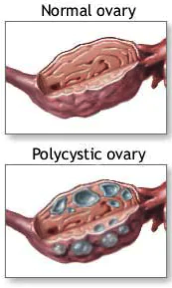PCOS related dismenorrhea and menstrual irregularity does often respond to Acupuncture and Chinese herbal medicine.
Polycystic ovary syndrome is the name given to a condition in which women with polycystic ovaries also have one or more additional symptoms. It was first ‘discovered’ in 1935 by Doctors Stein and Leventhal, so for many years it was known as the Stein-Leventhal syndrome.
The term polycystic ovaries describes ovaries that contain many small cysts (about twice as many as in normal ovaries), usually no bigger than 8 millimetres each, located just below the surface of the ovaries. These cysts are egg-containing follicles that have not developed properly due to a number of hormonal abnormalities.
Polycystic ovaries (PCO) are very common, affecting around 20 per cent of women. Polycystic ovary syndrome (PCOS) is also very common, affecting 5–10 per cent of women.
Polycystic ovary syndrome (PCOS):
Polycystic ovary syndrome (PCOS):
- affects millions of women in the UK and worldwide
- runs in families
- is one of the leading causes of fertility problems in women
- if not properly managed, can lead to additional health problems in later life
- can affect a woman’s appearance and self-esteem.

PCOS related dismenorrhea and menstrual irregularity does often respond to Acupuncture and Chinese herbal medicine. In practice,there is a greater and better response with the combined treatment of acupuncture and herbs; I may use western herbs to improve hormone balance, or Chinese herbal formula that are very effective in treating irregular menstruation and infertility or difficulties in conceiving
Acupuncture affect positively the hormone balance of the reproductive system, and stimulate a healthy blood flow in the pelvis and the reproductive organs; these are the two most important factors in regulating menstruation and promoting fertility
Acupuncture affect positively the hormone balance of the reproductive system, and stimulate a healthy blood flow in the pelvis and the reproductive organs; these are the two most important factors in regulating menstruation and promoting fertility
Self help for PCOS
Diet and exercise:
Many women with PCOS report that a low-glycemic index diet has an amazing effect on their symptoms.
For many women with PCOS, the low-glycemic index diets are the only way to lose weight.
The majority of women with PCOS have insulin resistance. Insulin resistance is what happens when your body overreacts to sugar and carbohydrates in your diet.
Eating certain foods such as white bread, rice, potatoes and sugary foods causes your blood sugar to rise quickly because these foods are digested very quickly.
In addition to a low glycemic (GI ) diet, regular, low intensity, prolonged exercises such as running, cycling, swimming are beneficial to lose weight, and regulate blood sugar.
Foods that are rich in D-Chiro-Inositol are also useful to regulate blood sugar and reduce insulin resistance:
Pulses and Cereals
Some other foods that are very high in D-Chiro-Inositol are beans, legumes and grain products.
Chickpeas, for example, contain 760 mg of D-Chiro-Inositol per 100 grams of food. Brown rice contains 700 mg of D-Chiro-Inositol per 100 grams of food. Wheat germ contains 690 mg of D-Chiro-Inositol per 100 grams of food.
Other great sources include lentils, with 410 mg per 100 grams of food; barley, with 390 mg per 100 grams of food; oats, with 320 mg per 100 grams of food, and whole wheat flour, with 170 mg per 100 grams of food. Buckwheat is another good source of D-Chiro-Inositol: use Buckwheat flour to make pancakes or Blinis, and use these instead of bread.
Meat
Certain sources of meat are great sources of D-Chiro-Inositol.
Meats high in D-Chiro-Inositol include veal and cow liver, with 340 mg of D-Chiro-Inositol per 100 grams of food and beef, with 260 mg of D-Chiro-Inositol per 100 grams of food.
Fruits and Vegetables
Fruits are vegetables that are high in D-Chiro-Inositol include oranges, which contain 210 mg per 100 grams of food; peas, which have 160 mg per 100 grams of food; grapefruit, which has 150 mg per 100 grams of food, strawberries, which have 95 mg per 100 grams of food; and cauliflower, which contains 92 mg of D-Chiro-Inositol per 100 grams of food.
Many women with PCOS report that a low-glycemic index diet has an amazing effect on their symptoms.
For many women with PCOS, the low-glycemic index diets are the only way to lose weight.
The majority of women with PCOS have insulin resistance. Insulin resistance is what happens when your body overreacts to sugar and carbohydrates in your diet.
Eating certain foods such as white bread, rice, potatoes and sugary foods causes your blood sugar to rise quickly because these foods are digested very quickly.
In addition to a low glycemic (GI ) diet, regular, low intensity, prolonged exercises such as running, cycling, swimming are beneficial to lose weight, and regulate blood sugar.
Foods that are rich in D-Chiro-Inositol are also useful to regulate blood sugar and reduce insulin resistance:
Pulses and Cereals
Some other foods that are very high in D-Chiro-Inositol are beans, legumes and grain products.
Chickpeas, for example, contain 760 mg of D-Chiro-Inositol per 100 grams of food. Brown rice contains 700 mg of D-Chiro-Inositol per 100 grams of food. Wheat germ contains 690 mg of D-Chiro-Inositol per 100 grams of food.
Other great sources include lentils, with 410 mg per 100 grams of food; barley, with 390 mg per 100 grams of food; oats, with 320 mg per 100 grams of food, and whole wheat flour, with 170 mg per 100 grams of food. Buckwheat is another good source of D-Chiro-Inositol: use Buckwheat flour to make pancakes or Blinis, and use these instead of bread.
Meat
Certain sources of meat are great sources of D-Chiro-Inositol.
Meats high in D-Chiro-Inositol include veal and cow liver, with 340 mg of D-Chiro-Inositol per 100 grams of food and beef, with 260 mg of D-Chiro-Inositol per 100 grams of food.
Fruits and Vegetables
Fruits are vegetables that are high in D-Chiro-Inositol include oranges, which contain 210 mg per 100 grams of food; peas, which have 160 mg per 100 grams of food; grapefruit, which has 150 mg per 100 grams of food, strawberries, which have 95 mg per 100 grams of food; and cauliflower, which contains 92 mg of D-Chiro-Inositol per 100 grams of food.
Food supplements that are useful for PCOS:
Chromium is an extremely important mineral if you have PCOS. It helps to encourage the formation of glucose tolerance factor (GTF) which is a substance released by the liver and required to make insulin more efficient.
A deficiency of chromium can lead to insulin resistance, which is a key problem in the case of PCOS; too much insulin can be circulating but it is unable to control your blood sugar (glucose) levels.
B vitamins Vitamins B2, B3, B5 and B6 are particularly useful for controlling weight: Vitamin B2 helps to turn fat, sugar and protein into energy. B3 is a component of the glucose tolerance factor (GTF), which is released every time blood sugar rises, and vitamin B3 helps to keep the levels in balance.
Vitamin B5 has been shown to help with weight loss because it helps to control fat metabolism. B6 is also important for maintaining hormone balance and, together with B2 and B3, is necessary for normal thyroid hormone production.
Zinc is an important mineral for appetite control and a deficiency can cause a loss of taste and smell, creating a need for stronger-tasting foods, including those that are saltier, sugarier and/or spicier (in other words, often more fattening!).
Zinc is also necessary for the correct action of many hormones, including insulin, so it is extremely important in balancing blood sugar. It also functions together with vitamins A and E in the manufacture of thyroid hormone.
Magnesium: Magnesium levels have been found to be low in people with diabetes and there is a strong link between magnesium deficiency and insulin resistance.
Co-Enzyme Q10 This is a vitamin-like substance that is contained in nearly every cell of your body. It is important for energy production and normal carbohydrate metabolism.
One study showed that people on a low-fat diet doubled their weight loss when they supplemented with Co-Q10 as compared to those who did not take it. Co-Q10 has also been proved useful in controlling blood sugar levels.
Garcinia cambogia Garcinia cambogia is a small tropical fruit called the 'Malabar tamarind'. It comes from central Asia, where the rind is used in Thai and Indian cooking. The garcinia contains HCA (hydroxy-citric acid) which enables carbohydrates to be turned into usable energy instead of being deposited as fat.
The HCA in this fruit seems to curb appetite, reduce food intake and inhibit the formation of fat and cholesterol. It seems to be particularly helpful when teamed with chromium.
Chromium is an extremely important mineral if you have PCOS. It helps to encourage the formation of glucose tolerance factor (GTF) which is a substance released by the liver and required to make insulin more efficient.
A deficiency of chromium can lead to insulin resistance, which is a key problem in the case of PCOS; too much insulin can be circulating but it is unable to control your blood sugar (glucose) levels.
B vitamins Vitamins B2, B3, B5 and B6 are particularly useful for controlling weight: Vitamin B2 helps to turn fat, sugar and protein into energy. B3 is a component of the glucose tolerance factor (GTF), which is released every time blood sugar rises, and vitamin B3 helps to keep the levels in balance.
Vitamin B5 has been shown to help with weight loss because it helps to control fat metabolism. B6 is also important for maintaining hormone balance and, together with B2 and B3, is necessary for normal thyroid hormone production.
Zinc is an important mineral for appetite control and a deficiency can cause a loss of taste and smell, creating a need for stronger-tasting foods, including those that are saltier, sugarier and/or spicier (in other words, often more fattening!).
Zinc is also necessary for the correct action of many hormones, including insulin, so it is extremely important in balancing blood sugar. It also functions together with vitamins A and E in the manufacture of thyroid hormone.
Magnesium: Magnesium levels have been found to be low in people with diabetes and there is a strong link between magnesium deficiency and insulin resistance.
Co-Enzyme Q10 This is a vitamin-like substance that is contained in nearly every cell of your body. It is important for energy production and normal carbohydrate metabolism.
One study showed that people on a low-fat diet doubled their weight loss when they supplemented with Co-Q10 as compared to those who did not take it. Co-Q10 has also been proved useful in controlling blood sugar levels.
Garcinia cambogia Garcinia cambogia is a small tropical fruit called the 'Malabar tamarind'. It comes from central Asia, where the rind is used in Thai and Indian cooking. The garcinia contains HCA (hydroxy-citric acid) which enables carbohydrates to be turned into usable energy instead of being deposited as fat.
The HCA in this fruit seems to curb appetite, reduce food intake and inhibit the formation of fat and cholesterol. It seems to be particularly helpful when teamed with chromium.

